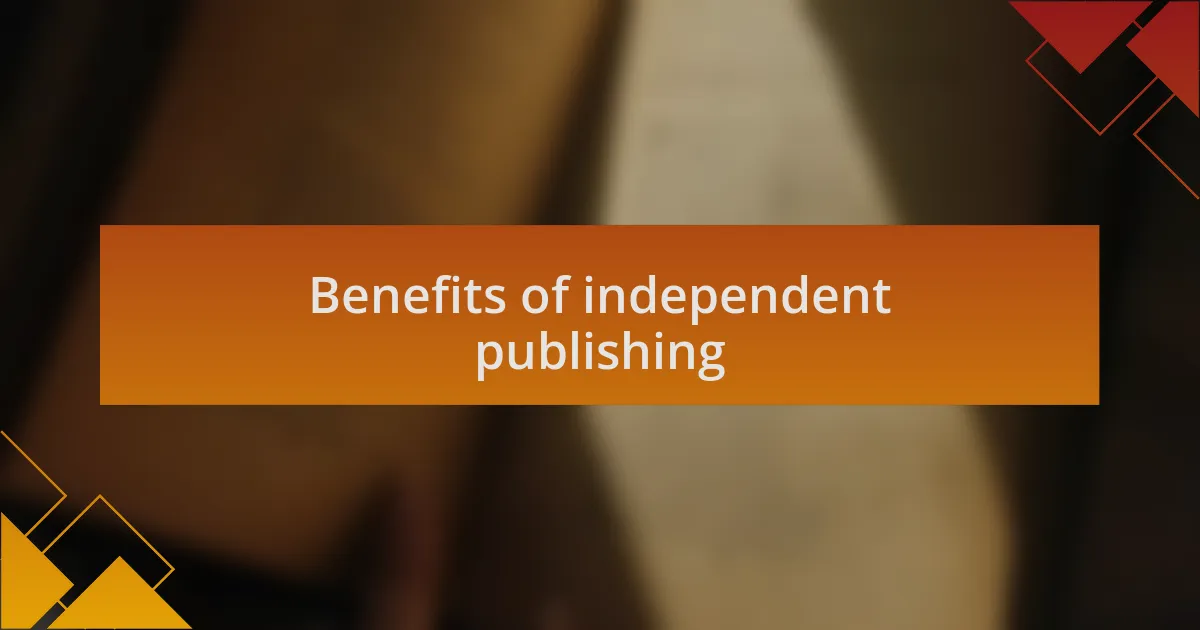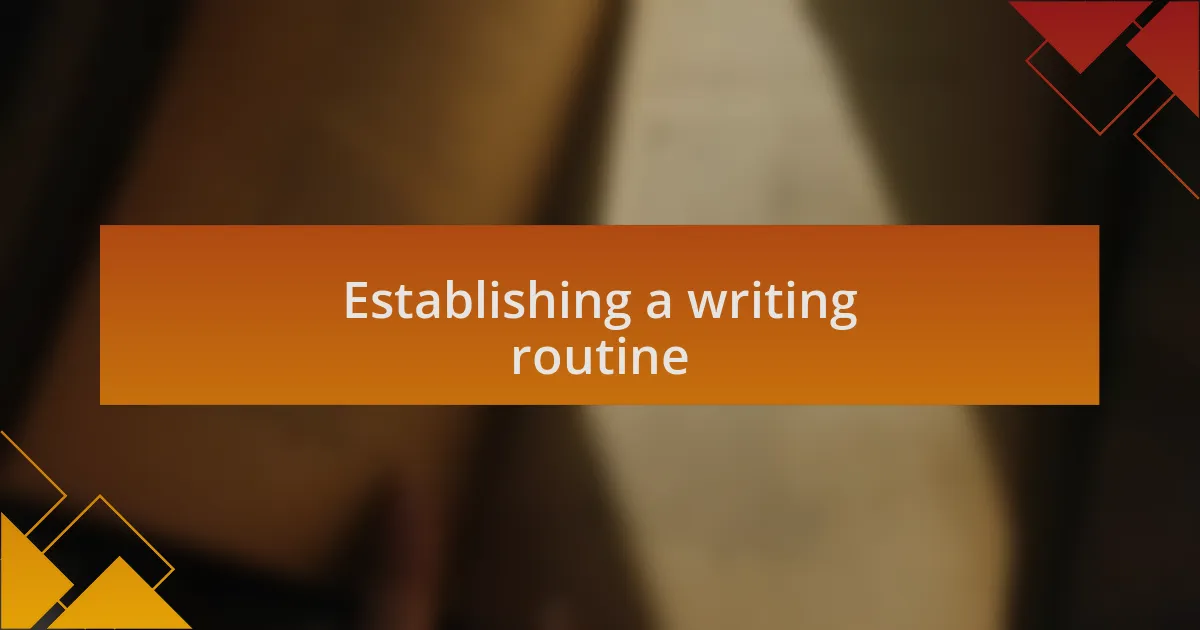Key takeaways:
- Writer’s block is often caused by internal pressures like fear and self-doubt, external distractions, and disconnection from the subject matter.
- Techniques to overcome writer’s block include changing the writing environment, free writing, and setting small, attainable goals.
- Independent publishing offers creative control, financial rewards, and direct engagement with readers, allowing authors to connect more personally with their audience.
- Establishing a writing routine can alleviate anxiety and enhance creativity, while also allowing for flexibility to adapt to changing moods and settings.
Understanding writer’s block
Writer’s block can feel like an insurmountable wall, leaving you staring at a blank page, waiting for inspiration to strike. I remember sitting down to write after a long day, only to find my thoughts scattered and my mind a complete blank. Have you ever experienced that frustration where you know what you want to say but can’t seem to find the right words?
Understanding writer’s block means recognizing that it’s not just a lack of ideas; it often stems from fear or self-doubt. There’s a time when I felt so pressured to produce something extraordinary that I completely choked, convinced that nothing I wrote would be good enough. This deep-seated anxiety can paralyze creativity, making it crucial to address those feelings head-on.
Some days, breaking through writer’s block is about creating a safe space for yourself to experiment without judgment. I once tried free writing, committing to put down anything that came to mind, no matter how silly or unrelated. Surprisingly, those unfiltered thoughts often led me to find the gems I was searching for. Have you found a method that brings you clarity during your creative droughts?
Causes of writer’s block
Writer’s block can often originate from internal pressures. I recall a time when I set high expectations for my writing and ended up staring at a blinking cursor, weighing every word against my self-imposed standards. That anxiety created a mental gridlock that kept me from expressing my ideas freely. How can we encourage ourselves to let go of that need for perfection?
Another cause of writer’s block is external distractions, which I experienced vividly during a bustling period in my life. There were moments when my family and work commitments tugged at my attention, drowning out my creative thoughts. I found it hard to focus in a noisy environment, and that lack of concentration only fueled my frustration further. Have you ever felt like the world around you was conspiring against your writing?
Sometimes, simply feeling disconnected from the subject can trigger writer’s block. I remember struggling to write about a topic I thought I had mastered, only to realize my passion for it had waned. It’s as if the words slipped through my fingers, and I could only wonder, “How do I reignite that spark?” This disconnect can be a wake-up call to reflect on what truly inspires us as writers.
Techniques to overcome writer’s block
One technique I’ve found effective is changing my environment. I remember a particularly challenging week when I felt completely uninspired at my desk. So, I packed my laptop and headed to a local café. The buzz around me, the aroma of coffee, and the refreshing shift in scenery transformed my mindset. Have you tried writing in a different setting? It can do wonders for revitalizing your creativity.
Another approach that has served me well is free writing. There was a day I felt paralyzed by my own thoughts, but I committed to writing without worrying about grammar or coherence for ten minutes. To my surprise, I ended up uncovering ideas I hadn’t even realized were lurking beneath the surface. Isn’t it fascinating how letting go of control can lead to unexpected insights?
Lastly, I’ve learned the importance of setting small, attainable goals. There was a point when my ambitions felt overwhelming, and the weight of completing an entire chapter would freeze me in place. Instead, I started writing just one paragraph a day. Those small victories built my confidence, reminding me that progress is still progress, no matter how minor it may seem. How often do we forget to celebrate those little wins?

Benefits of independent publishing
Independent publishing offers a remarkable level of creative control. I remember the excitement of crafting my own cover design and deciding how my book would be marketed. There’s something empowering about being the captain of your literary ship, isn’t there? You have the freedom to make choices that align with your vision without the constraints imposed by traditional publishing houses.
Financially, independent publishing can be quite rewarding. I’ve seen authors who initially expected to earn only a small percentage of royalties suddenly find themselves making significant profits from their own sales. It’s a game-changer when you realize that every book sold puts more money directly into your pocket. Doesn’t it feel great to reap the benefits of your hard work?
Moreover, independent publishing fosters a direct connection with readers. When I self-published my first book, I enjoyed engaging with my audience through social media and events. Each interaction built a community around my work that traditional publishing often lacks. Isn’t it fulfilling to know that your words resonate with individuals on a personal level?
Personal strategies for writer’s block
When I encounter writer’s block, my first strategy is to change my environment, even if just for a bit. Sitting in a different spot, like a cozy café or a quiet park, can inspire fresh ideas and shake off that stubborn creative fog. Have you ever noticed how simply changing your scene can spark new thoughts?
Another tactic that has worked wonders for me is setting small, achievable writing goals. Instead of staring at a blank page, I challenge myself to write just 100 words. This feels manageable and often leads to much more than I initially planned. I find that once I start writing, even a little, the words tend to flow more easily.
Lastly, I embrace the power of brainstorming or free writing, allowing my thoughts to spill onto the page without judgment. This process reminds me that not everything needs to be perfect right away. It’s liberating to realize that my first drafts can be messy, and sometimes, those messy ideas lead to the best breakthroughs. Do you allow yourself that freedom? I’ve often found my best stories hiding within those unkempt pages.

Establishing a writing routine
Establishing a writing routine has been a game changer for me. I’ve found that setting aside a specific time each day, whether it’s early morning or late at night, creates a sense of expectation. When I know it’s “writing time,” I mentally prepare, making it easier to transition into that creative space. What about you? Have you tried dedicating certain hours solely to your writing?
In my experience, a consistent routine helps to lessen the anxiety that often accompanies writer’s block. For example, I like to start my day with a cup of coffee and a few minutes of reading before I write. This small ritual not only warms up my mind but also helps me clear out the cobwebs and reach a focused state. I remember one particularly fruitful morning when I got lost in a short story after just a few pages; that was all it took to ignite my creativity.
Another key element to my routine is flexibility. While I appreciate the structure, I also recognize the importance of adapting to my mood or energy levels. Sometimes, I may switch from writing at my desk to sitting on my patio, allowing the fresh air to rejuvenate my thoughts. Have you ever felt stuck but then found that changing your setting slightly made all the difference? Embracing this fluidity in my routine is essential to keeping my creative juices flowing.